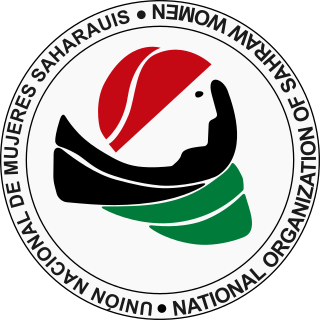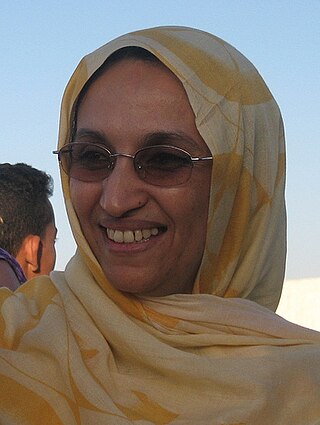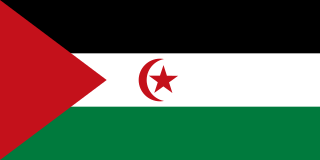
All data about demographic information regarding Western Sahara are extremely error-prone, regardless of source. Most countries take censuses every ten years, and some every five in order to stay abreast of change and miscounts; the last count was conducted in 1970, and even that data by colonial Spain is considered unreliable due to large nomadic populations.

The National Union of Sahrawi Women is the women's wing of the Polisario Front. It was created in 1974, and claims to have 10,000 members, divided between the Sahrawi refugee camps, the Liberated territories, the Moroccan-occupied part of Western Sahara and the Sahrawi diaspora.

Aminatou Ali Ahmed Haidar, sometimes known as Aminetou, Aminatu or Aminetu, is a Sahrawi human rights activist and an advocate of the independence of Western Sahara. She is often called the "Sahrawi Gandhi" or "Sahrawi Pasionaria" for her nonviolent protests. She is the president of the Collective of Sahrawi Human Rights Defenders (CODESA). She was imprisoned from 1987 to 1991 and from 2005 to 2006 on charges related to her independence advocacy. In 2009, she attracted international attention when she staged a hunger strike in Lanzarote Airport after being denied re-entry into Moroccan Western Sahara. Haidar has won several international human rights awards for her work, including the 2008 Robert F. Kennedy Human Rights Award, 2009 Civil Courage Prize and 2019 Right Livelihood Award.

Tifariti is an oasis town and the temporary capital of the Sahrawi Arab Democratic Republic, located in north-eastern Western Sahara, east of the Moroccan Berm, 138 km (86 mi) from Smara and 15 km (9 mi) north of the border with Mauritania. It is part of what Polisario Front calls the Liberated Territories and Morocco call the Buffer Zone. It has been the de facto temporary capital of the Sahrawi Arab Democratic Republic since the government moved there in 2008 from Bir Lehlou. It is the headquarters of the 2nd military region of the SADR.

Mahfoud Ali Beiba Hammad Dueihi was a Sahrawi politician and co-founder of the Polisario Front, a national liberation movement that seeks self-determination for Western Sahara. From 1975 until his death, he lived in an exile in the refugee camps of Tindouf, Algeria.

The Sahrawi National Council or Sahrawi Parliament is the legislature of the Sahrawi Arab Democratic Republic. Its structure and competences are guided by the Constitution of the Sahrawi Arab Democratic Republic (SADR). The present speaker since 2020 is Hamma Salama.

The foreign relations of the Sahrawi Arab Democratic Republic (SADR) are conducted by the Polisario Front, which maintains a network of representation offices and embassies in foreign countries.

Omar Emboirik Ahmed Abdelahi was the Sahrawi ambassador to Venezuela until late 2012, also accredited non-resident ambassador to Bolivia and Ecuador, with a base in Caracas.

Mariem Hassan, la voz del Sáhara is a 2007 documentary film directed by Manuel Domínguez.

Panama–Sahrawi Republic relations refers to the current and historical relations between the Republic of Panama and the Sahrawi Arab Democratic Republic (SADR). Panama was the first state of The Americas to recognize the SADR in July 1978, formal diplomatic relations were established on 1 June 1979. A Sahrawi embassy was opened in Panama City in 1980, during the Aristides Royo government.

Mexico–Sahrawi Republic relations are the current and historical relations between Mexico and the Sahrawi Arab Democratic Republic (SADR). Mexico recognized the SADR on 8 September 1979.

The Sahrawi Arab Democratic Republic, also known as the Sahrawi Republic and Western Sahara, is a partially recognized state, recognized by 46 UN member states and South Ossetia, located in the western Maghreb, which claims the non-self-governing territory of Western Sahara, but controls only the easternmost one-fifth of that territory. Between 1884 and 1975, Western Sahara was known as Spanish Sahara, a Spanish colony. The SADR is one of the two African states in which Spanish is a significant language, the other being Equatorial Guinea.
Elghalia Djimi is the vice president of the organization Sahrawi Association of Victims of Grave Human Rights Violations Committed by the Moroccan State. In this organization she records accounts of human rights violations and also coordinates the work of the organization in the absence of the president. She is also a member of the Committee for the Families of Disappeared Saharawis.

Sahrawi Arab Democratic Republic–Spain relations are the current and historical relations between the Sahrawi Arab Democratic Republic and Spain.
Saharan Spanish is the variety of the Spanish language spoken in Western Sahara and adjacent regions. This non-native variety is heavily influenced by both Spanish cultural links and a strong expatriate community who live in Spain and Hispanic America, particularly Cuba.
Nadhira Mohamed is a Spain-based Sahrawi activist and actress. She has been described by some academics as the first Sahrawi actress.

Peru–Sahrawi Republic relations refers to the current and historical relations between the Republic of Peru and the Sahrawi Arab Democratic Republic (SADR).

Ebbaba Hameida Hafed is a Sahrawi-Spaniard journalist. She is currently a writer for Radio Televisión Española (RTVE), highlighting her work on migration and women's rights. She has been a member of the board of directors of the Spanish section of Reporters Without Borders since May 2020.














